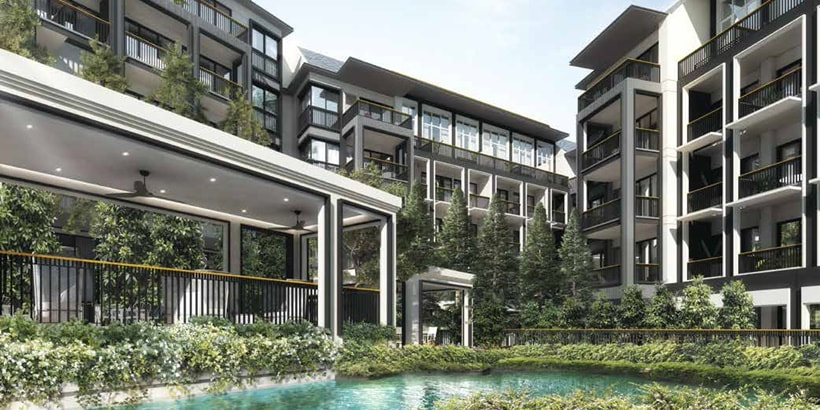Malaysia's Pakatan Harapan announced in its budget that it will spend RM1.5 billion (S$495 million) on public housing next year - more than double last year's allocation - to encourage home ownership, especially for first-time buyers from lower-income groups. Finance Minister Lim Guan Eng said that a RM1 billion fund will be set up by Malaysia's central bank to give out home loans with an interest rate of 3.5 per cent per annum to help those earning less than RM2,300 a month to buy properties priced at RM150,000 and below.
Runaway home prices were a major grouse during the former Najib Razak administration despite extensive efforts to provide affordable options. Bank Negara Malaysia on Sept 26 said the country's housing glut was worsening as more units remained unsold, with 80 per cent of these priced above RM250,000 and seen as unaffordable to most Malaysians. These measures are expected to give between 7 per cent and 11 per cent cost savings to house buyers, before taking into consideration any promotional discounts that may be offered by property developers.
US home prices cool as sales slump in pricey western cities
US home-price gains and sales slowed in the third quarter as higher mortgage rates cut into affordability, the National Association of Realtors said. The national median price of a previously owned single-family home was US$266,900, up 4.8 per cent from a year earlier. In last year's third quarter, prices rose 5.3 per cent on an annual basis. While the inventory of home listings is climbing, it is still historically low, and the job market is strong. The combined forces of a tight supply and heightened demand are still driving up prices, albeit at a slower pace. Higher borrowing costs have made some buyers hesitate. While supplies are adequate on the high end, there is an insufficient supply of low- to mid-priced homes, so would-be buyers in those segments are getting pushed out of the market.
The marketing materials for Ruyi Island, a man-made chunk of land about 5km north-east of the capital of China's Hainan province, depict a utopia for the wealthy. An artist's impression shows families strolling along marina boardwalks strung with fairy lights and villas nestled around palm tree-lined lagoons. In reality, Ruyi Island - five years after construction started - remains a huge sand bank, a few cranes sitting idle. Its developer, Beijing-based Zhonghong Holding, is in the process of selling, or at least trying to sell, the 13 billion yuan (S$2.6 billion) project to a competitor after burning through cash and piling up debt. Ruyi Island offers a glimpse of the convulsions shaking China's more than 100,000 developers, who rushed to capitalise on friendly government policies, insatiable housing demand and a nearlimitless supply of cheap debt in recent years. With the government now prioritising keeping corporate China's mountain of debt in check, the industry finds itself in the early innings of an epic shakeout. Making matters worse, local authorities in parts of China are starting to dismantle a system where developers collect cash from buyers long in advance of finishing their homes, potentially robbing them of a major funding channel.
S'pore firms look to China's millennials to drive future sales
Singapore companies are putting their bets on China's rising wealthy millennials to drive future sales despite the ongoing trade war between China and the United States and a cyclical downturn in electronics, a survey has found. A majority of the 120 Singapore firms surveyed in September by British bank HSBC said competing on price is not a sustainable strategy in the Chinese market. They feel regional trade pacts such as the Asean-China Free Trade Area (ACFTA) will likely help them with their businesses in China. The Singapore firms were among the 1,205 small and large companies from 11 key economies, including Hong Kong, France and Mexico, surveyed in HSBC's inaugural Navigator: Made for China report. Among the Singapore companies polled, 49 per cent say China is currently a sales destination. Out of these firms, 69 per cent say it is among the most important destinations. More than 80 per cent of the Singapore companies see millennials as the driver of future sales.
Chongqing-Singapore financial links get boost with over 10 MOUs inked
Interest is picking up on opportunities for collaboration between South-east Asia and western China as more than 500 business leaders and government officials descended on Chongqing for the inaugural China (Chongqing)-Singapore Connectivity Initiative Financial Summit on Friday.
Ten memoranda of understanding (MOUs) were inked during the summit, which aims to enhance regional connectivity under China's Belt and Road Initiative, and the Chongqing Connectivity Initiative Southern Transport Corridor (STC), a rail-sea transport link between China and Southeast Asia. Among the agreements signed, the Singapore FinTech Association will form an alliance with the Chongqing authorities to develop Chongqing's fintech industry, the Monetary Authority of Singapore (MAS) said in a Friday press statement.
China and Singapore have concluded talks on upgrade of FTA
Singapore and China have concluded negotiations on an upgraded free trade pact (FTA) between the two countries, said Singapore's Ministry of Trade and Industry (MTI). This was announced after a meeting between Chan Chun Sing, Singapore's Minister for Trade and Industry and Fu Ziying, one of China's Vice-Commerce Ministers and its International Trade Representative, on the sidelines of the inaugural China International Import Expo in Shanghai. Both countries are "working towards the signing of the upgrade protocol later this year", MTI said. Many more companies and businesses will benefit from this upgrade. And it will cover more areas than before. The enhanced trade pact will provide Singapore businesses with greater trade facilitation and investment protection in China. It will also extend cooperation in legal and financial services, as well as e-commerce and the environment. The current free trade pact between the two countries came into force in 2009 and was China's first with another Asian country.
Rich Chinese and other Asians are increasingly seeking more control of their wealth, driving a rapid rise in the number of so-called family offices, or private investment vehicles, being set up in Hong Kong and Singapore. As the wealthy target greater investment diversification and as business owners hand over the reins to successors, family offices are sprouting in the Asian financial hubs, taking advantage of incentives such as tax breaks and residency being offered. The family office is a relatively new concept in Asia, with less than 500 such entities, compared to thousands in the West. They offer a one-stop solution to managing the wealth of the rich, including investments, charitable giving, taxation and wealth transfer. Staffed by bankers, fund managers, lawyers and tax practitioners, some even provide overseas private schooling and travel arrangements as add-on services. The rich are favouring family offices as they get personalised attention and are able to have a bigger say in their wealth management.






 RSS Feed
RSS Feed
